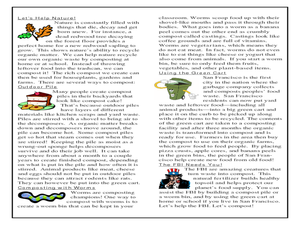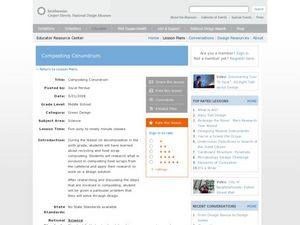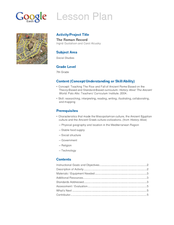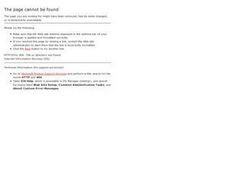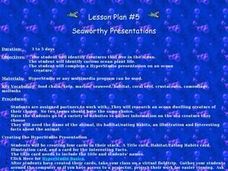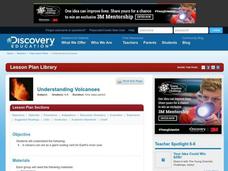Curated OER
Let's Build a Worm Bin
Students explore the process of decomposition. In this ecology and measurement lesson, students prepare a worm home to be used for vermicomposting. Students weigh a group of worms and the added food, recording this information on a data...
Curated OER
Understanding Oceans
Students investigate how ocean currents affect our world. In this ocean currents instructional activity, students perform an experiment to show how cold water is near the poles and warm water is near the equator. Students use water, food...
Curated OER
El Menu
Students, in groups, create a menu in Spanish. Then each group must present their menus to the class.
Curated OER
Composting Conundrum
Students research cafeteria composting. In this composting lesson, students design a vessel that would allow the cafeteria staff to collect food scraps for composting. Then students build a prototype and present it to the class. Lastly...
Curated OER
The Family Tree
Middle schoolers make a family tree. In this family lesson, students brainstorm what the word family means, interview their family members and grandparents, create a family tree, list their family's favorite foods and write an essay...
Curated OER
History in the Making: The Tortilla
Fourth graders examine the history of the tortilla and extend the study across the curriculum. In this history of the tortilla lesson, 4th graders research the background of the tortilla, determine the ingredients, and work with the...
Pennsylvania Department of Education
The Digestive System
Fourth graders simulate how the digestive system works. In this hands-on simulation, 4th graders complete six group activities that help students visualize how our body breaks down food into nutrients.
Curated OER
Tornado In A Bottle
Students are able to visualize a tornado usig a simple experiment. They are divided into small groups. Students drill a 3/8 inch hole in the center of each bottle cap. Students connect the caps to the top of each other using glue. ...
Curated OER
Dinosaurs
Learners participate in a simulated archeological dig to gain an understanding of the earth's development as well as the organisms on it. In this dinosaur lesson plan, students work in small groups removing five pieces from the 'dig' one...
Teachers' Curriculum Instituted
The Roman Record
Using Google Earth, Google Docs, and other Google Tools, collaborative groups of seventh graders research and then create and share online newspapers reporting on the early development, geographical features, political issues, and family...
Curated OER
Under the Sea Webquest
Fourth graders work in small groups to research a selected species of ocean creature. They conduct Internet research, complete a WebQuest and worksheet, and complete a group oral presentation that includes an illustration of the food...
Curated OER
Animal Classification
Third graders differentiate between vertebrates and invertebrates, and identify the main characteristics of mammals, fish, reptiles, amphibians, and birds. They sort and categorize different types of balls, discuss the characteristics...
Curated OER
Architects of the Coral Reef
Students discuss reproduction in Cnidaria. in this coral reef lesson, students describe five characteristics of Cnidaria and compare and contrast the four classes. They describe the reproduction strategies they use.
Curated OER
Yummy Adjectives
Fourth graders recognize and brainstorm descriptive adjectives to use in their writing. They work in pairs to take a taste and touch test and record their adjectives used to describe the food and knick-knacks on handout. This is a great...
Curated OER
Explore: Third Grade Scents
Students use the olfactory sense to determine if a marker is appropriate 'food' or not. This experience helps students explain why so many animals rely on the sense of smell to find prey.
Curated OER
Healthy Eating
Students explore how they can make healthy food choices and assess how "eating healthy" requires knowledge and planning ahead. They review and discuss The Edible Pyramid as well before they complete this project online. Each student maps...
Curated OER
Mississippian Gardens
Students research and plan a Mississippian garden. In this Native American history lesson, students work in groups to research crops used by Native Americans in the Mississippian Period and use the information to plan and create an...
Curated OER
Seaworthy Presentations
First graders research ocean animals and plants on the web. For this ocean habitat lesson, 1st graders prepare a multimedia presentation. Students will work on their presentations in pairs and every group should have its own animals or...
Curated OER
Understanding Volcanoes
Students create a model volcano in groups, and discuss what each part of the model represents as they go along. In this volcano lesson, students come back together as a whole group and discuss what group did the best work, according to...
Curated OER
A Day In The Life Of An Egyptian
High schoolers divide into research groups, and are each assigned a research topic. They access an award-winning Ancient Egypt site, which is an interactive book about the history and culture of the Ancient Egyptian civilization.
Curated OER
Kids Collect LEGOs for New Orleans
Students read and discuss a news article about children that collected 1.5 million LEGO bricks for kids in New Orleans after Hurricane Katrina. They complete a fill-in-the blank activity, answer article comprehension questions, solve...
Curated OER
Integrated Social Studies and Cooking Lesson
Fourth graders study the Civil War and discuss what soldiers ate during that time period. In groups, representing Union and Confederate soldiers, they follow recipes, prepare, eat, and share Union hardtack and Confederate Johnnie Cakes.
Curated OER
Mesoamerican Market Fair
Students organize an Mesoamerican market fair. In this early civilizations lesson, students celebrate the culmination of a unit on Mesoamerican cultures by planning, marketing, and hosting a market fair complete with food, games,...
Curated OER
A Famine Glossary
In this history of Ireland worksheet, students match eleven words from a word bank with their definitions. They finish a chart comparing their diet with that of a poor person from Ireland in 1845. Students write answers to 5 essay...


